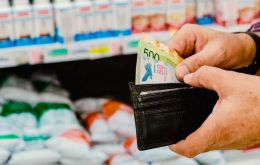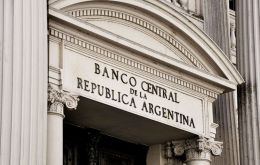MercoPress. South Atlantic News Agency
Tag: National Institute of Statistics and Census (Indec)
-
Thursday, December 11th 2025 - 22:22 UTC
Argentina's inflation reaches 2.5% in November

Argentina's Consumer Price Index (CPI) accelerated in November, reaching 2.5% for the month, according to data released on Thursday by the National Institute of Statistics and Censuses (Indec).
-
Wednesday, November 12th 2025 - 20:12 UTC
Argentina: Indec says inflation in October climbs 2.3%

Argentina's Consumer Prices Index (CPI) rose by 2.3% in October, accelerating from the 2.1% recorded in September, the National Institute of Statistics and Censuses (INDEC) reported Wednesday. The new data brings the total accumulated inflation for the first ten months of 2025 to 24.8%. The year-on-year inflation rate climbed to 31.3%.
-
Wednesday, October 15th 2025 - 03:09 UTC
Indec says inflation in Argentina went up 2.1% last month

According to a report released on Tuesday by Argentina's National Institute of Statistics and Censuses (Indec), the country's Consumer Price Index (CPI) increased by 2.1% in September 2025, for an accumulated 22% in the first three quarters of the year and a 31.8% interannually.
-
Wednesday, August 13th 2025 - 09:47 UTC
Argentina: July's CPI projected below 2%

According to the Market Expectations Survey (REM) from Argentina's Central Bank (BCRA), which collects projections from consulting firms and research centers monthly, inflation in July is expected to be 1.8%, a slight increase from June's 1.6%. This figure is foreseen despite the dollar rising 14% during the same month.
-
Tuesday, July 15th 2025 - 11:13 UTC
Indec says June's inflation in Argentina was 1.6%

Argentina's National Institute of Statistics and Census (Indec) reported on Monday that inflation in June was 1.6%, marking the second-lowest monthly figure of the year. This brings the cumulative inflation for the first six months of 2025 to 15.1%. The year-on-year inflation rate stood, thus, at 39.4%.
-
Friday, June 20th 2025 - 09:07 UTC
Argentina: unemployment hits record figures

Argentina's unemployment rate rose to 7.9% in Q1 2025, the highest since Q3 2021, up 0.2% from Q1 2024 and 1.5% from Q4 2024, according to a report from the National Institute of Statistics and Census (Indec) released Thursday in Buenos Aires.
-
Friday, April 11th 2025 - 19:19 UTC
Argentina: Inflation in March hits 3.7%

Argentina's Consumer Price Index (CPI) for the month of March reached 3.7%, the National Institute of Statistics and Census (Indec) reported Friday. These figures marked a sharp increase from February's 2.4% and January's 2.2%. The rise was driven primarily by higher food prices, particularly meat and vegetables, with public services also playing a role. Internannual inflation stood at 66.9% and 4.7% so far in 2025.
-
Tuesday, April 8th 2025 - 09:17 UTC
Economists forecast Argentina's inflation to near 3%

Argentina's Central Bank's (BCRA) issue of the Market Expectations Outlook (Relevamiento de Expectativas del Mercado - REM) released Monday with data collected between March 27 and 31 among 39 experts raised the inflation forecast for last month to 2.6% from the previous 2.2%, which would represent an acceleration from January’s 2.2% and February’s 2.4%.
-
Tuesday, April 1st 2025 - 10:52 UTC
Milei celebrates official figures showing a decline in poverty

Argentine President Javier Milei Monday boasted his administration's achievement of lowering poverty from 52.9% in the first semester of 2024 to 38.1% by the end of the year, compared to 41.7% at the end of 2023. Indigence (extreme poverty) also decreased to 8.2% from higher levels earlier in the year, according to a report released Monday by the National Institute of Statistics and Census (Indec).
-
Friday, February 21st 2025 - 19:37 UTC
An average Argentine worker earns US$ 482/month, Indec says

Argentina's National Institute of Statistics and Census (Indec) Permanent Household Survey (EPH) released this week showed that the average income per worker in Argentina during the third quarter of 2024 amounted to AR$ 588,011 (nearly US$ 482 at Friday's unofficial exchange rate, also referred to as “blue,” which is a euphemism for “black market”).
